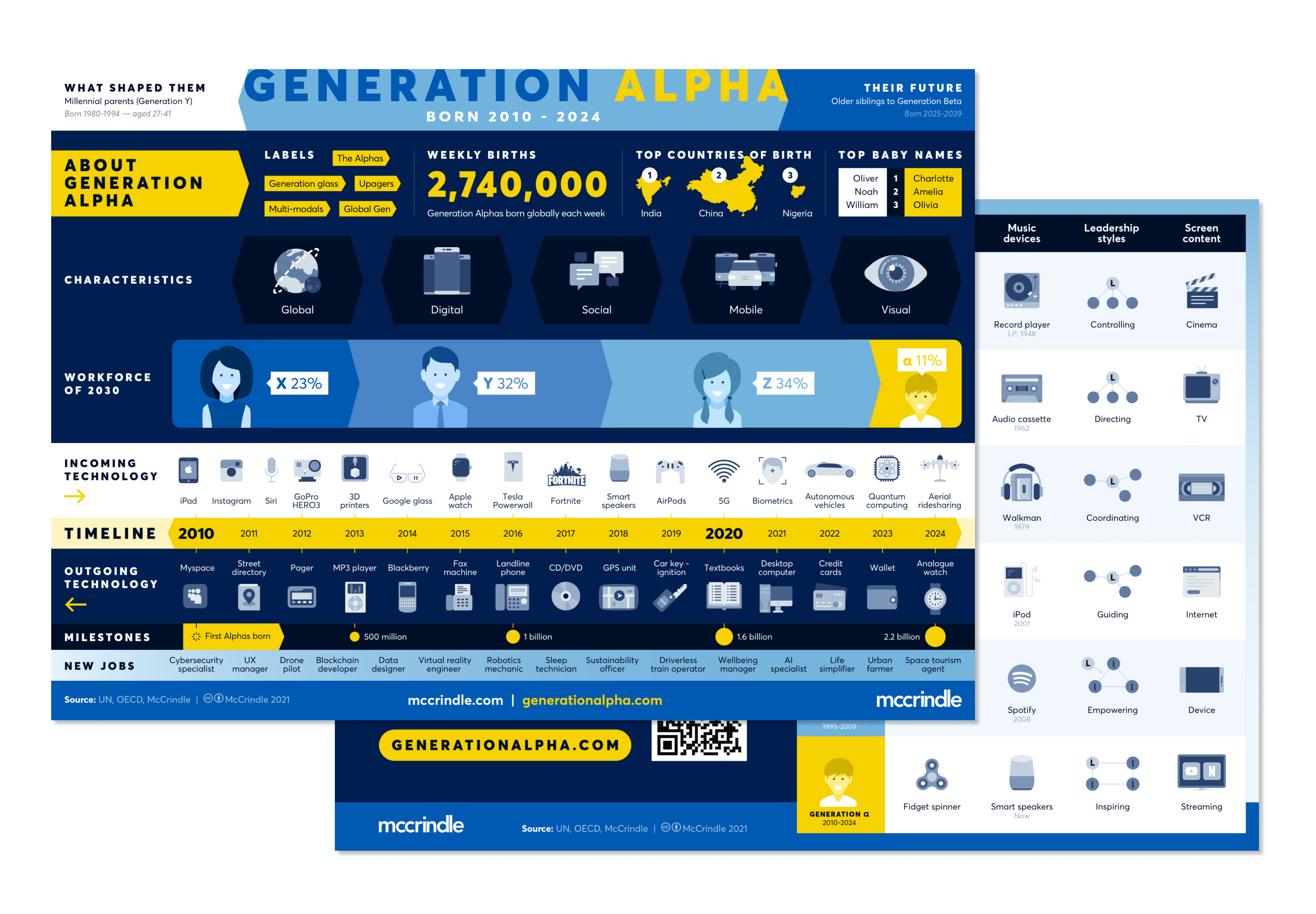Generation Alpha
Generation Alpha: The new kids on the block

There is a generation that comprises more than one in seven people. Within the next four years they will outnumber the Baby Boomers and most of them will live to see the 22nd century. We’re talking about Generation Alpha, the current generation of children who began being born in 2010.
They will live longer, work later into their life and will be more formally educated than any generation before them. By the time Generation Alpha have all finished being born, they will be the largest generation in the history of the world.
How we came to name them Generation Alpha
Back in 2009, we realised that Generation Z was about to finish being born, and that there was no label for the generation to come after. So, we ran a survey and asked the public, “What do you think the next generation should be called?” Some people suggested descriptive labels like the ‘onliners’ or the ‘dot com kids’. Others suggested ‘Generation A’. But we knew that going back to the beginning was not what we should communicate about this generation. It’s not history repeating itself. They are the first generation to be fully born in the 21st century. They are the start of a whole new reality.
It is a great honour to have been involved in naming the next generation. Like any parent knows, naming a child is a gift that you bestow on that child. And while it’s an important part of their identity, it’s not who they are. What matters far more than that is the name that they make for themselves. So, we deliberately went to the scientific nomenclature using the Greek lettering, because that gives an empty vessel into which Generation Alpha can create a meaning for themselves and their own record in history.
Defining characteristics
When we look back over the long arc of history, there are areas in which society altogether changed. We give them names, the reformation, the enlightenment, the industrial revolution, post-modernity. And now in the era of Generation Alpha, this digital transformation. For many people, portable screens and devices are the most obvious difference as to what is shaping this generation. Screens became ubiquitous from their birth and has been core to their early years, entertainment, communications, schooling and interactions generally. It’s the source of information that they largely go to. Books are digital for them. It has been transformative for them.
Global connectivity also defines them. The devices, entrepreneurial mindset, experience of COVID-19, and the empowerment that they have is true across all continents. Having this experience in their early years is going to be very formative for them. They are also an empowered generation. Children today have leverage, influence, and a voice, far more than children of the past did. This is through social media and the collectivism they bring, but also because they are listened to by parents and educators. They are empowered and able to influence and shape their world from a young age. They’ve got impact and spending powers beyond even their own realities. These are some of the key characteristics that make them such an important and transformative generation.
Why people are starting to take note that this generation is here
Healthy societies have always had a focus on their children. From infant health to numeracy and literacy rates, educational outcomes, school completion, family dynamics and stability. These things help us see how nations are performing and where improvements are needed.
Another reason people are focusing on Generation Alpha, is because they are being shaped in times which are changing faster than ever. Generation Alpha are growing up digital, with devices and platforms that have never existed for any other generation of children. They are also more globally connected and are now growing up in a COVID-19 impacted world. Their life stage of childhood and adolescence is significant, and in rapidly changing times, it means that understanding them and doing what we can to set them up for a future win in their lives, is critical.
Their future is a bright one
It is true that Generation Alpha are growing up in a time of increasing complexity and uncertainty, with greater societal, economic, and social volatility. This can lead to people being fearful about Generation Alpha’s future. So, it may come as a surprise to many that we believe the outlook for this generation is positive. Even in recent COVID-19 times which have been incredibly isolating, Generation Alpha have found humour and connection, and that gives us hope. Generation Alpha, by life stage, are optimistic, creative, solution-minded and adaptive to their environment. These are the only times these kids have ever known. They’re excited to be living at this amazing time, with the future ahead of them that they will be active in shaping. While it’s important to give them support, direction and wisdom, we also need to equip them with tools and solutions to create and actively shape their own future.
Even in recent COVID-19 times which have been incredibly isolating, Generation Alpha have found humour and connection, and that gives us hope. Generation Alpha, by life stage, are optimistic, creative, solution-minded and adaptive to their environment. These are the only times these kids have ever known. They’re excited to be living at this amazing time, with the future ahead of them that they will be active in shaping. While it’s important to give them support, direction and wisdom, we also need to equip them with tools and solutions to create and actively shape their own future.





